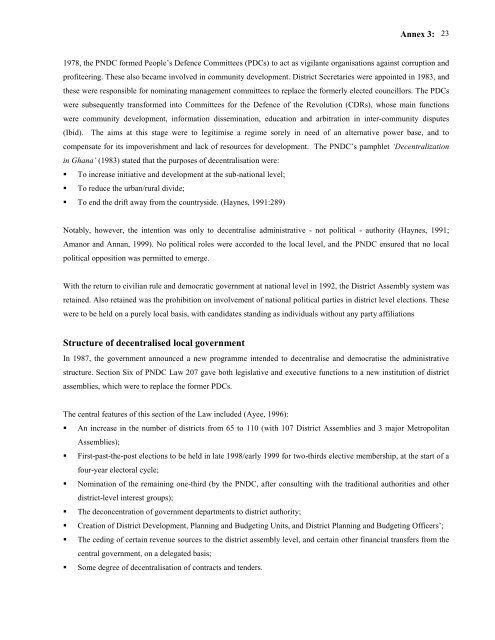Poverty Dimensions of Public Governance and Forest Management ...
Poverty Dimensions of Public Governance and Forest Management ...
Poverty Dimensions of Public Governance and Forest Management ...
You also want an ePaper? Increase the reach of your titles
YUMPU automatically turns print PDFs into web optimized ePapers that Google loves.
Annex 3: 23<br />
1978, the PNDC formed People’s Defence Committees (PDCs) to act as vigilante organisations against corruption <strong>and</strong><br />
pr<strong>of</strong>iteering. These also became involved in community development. District Secretaries were appointed in 1983, <strong>and</strong><br />
these were responsible for nominating management committees to replace the formerly elected councillors. The PDCs<br />
were subsequently transformed into Committees for the Defence <strong>of</strong> the Revolution (CDRs), whose main functions<br />
were community development, information dissemination, education <strong>and</strong> arbitration in inter-community disputes<br />
(Ibid). The aims at this stage were to legitimise a regime sorely in need <strong>of</strong> an alternative power base, <strong>and</strong> to<br />
compensate for its impoverishment <strong>and</strong> lack <strong>of</strong> resources for development. The PNDC’s pamphlet ‘Decentralization<br />
in Ghana’ (1983) stated that the purposes <strong>of</strong> decentralisation were:<br />
! To increase initiative <strong>and</strong> development at the sub-national level;<br />
! To reduce the urban/rural divide;<br />
! To end the drift away from the countryside. (Haynes, 1991:289)<br />
Notably, however, the intention was only to decentralise administrative - not political - authority (Haynes, 1991;<br />
Amanor <strong>and</strong> Annan, 1999). No political roles were accorded to the local level, <strong>and</strong> the PNDC ensured that no local<br />
political opposition was permitted to emerge.<br />
With the return to civilian rule <strong>and</strong> democratic government at national level in 1992, the District Assembly system was<br />
retained. Also retained was the prohibition on involvement <strong>of</strong> national political parties in district level elections. These<br />
were to be held on a purely local basis, with c<strong>and</strong>idates st<strong>and</strong>ing as individuals without any party affiliations<br />
Structure <strong>of</strong> decentralised local government<br />
In 1987, the government announced a new programme intended to decentralise <strong>and</strong> democratise the administrative<br />
structure. Section Six <strong>of</strong> PNDC Law 207 gave both legislative <strong>and</strong> executive functions to a new institution <strong>of</strong> district<br />
assemblies, which were to replace the former PDCs.<br />
The central features <strong>of</strong> this section <strong>of</strong> the Law included (Ayee, 1996):<br />
! An increase in the number <strong>of</strong> districts from 65 to 110 (with 107 District Assemblies <strong>and</strong> 3 major Metropolitan<br />
Assemblies);<br />
! First-past-the-post elections to be held in late 1998/early 1999 for two-thirds elective membership, at the start <strong>of</strong> a<br />
four-year electoral cycle;<br />
! Nomination <strong>of</strong> the remaining one-third (by the PNDC, after consulting with the traditional authorities <strong>and</strong> other<br />
district-level interest groups);<br />
! The deconcentration <strong>of</strong> government departments to district authority;<br />
! Creation <strong>of</strong> District Development, Planning <strong>and</strong> Budgeting Units, <strong>and</strong> District Planning <strong>and</strong> Budgeting Officers’;<br />
! The ceding <strong>of</strong> certain revenue sources to the district assembly level, <strong>and</strong> certain other financial transfers from the<br />
central government, on a delegated basis;<br />
! Some degree <strong>of</strong> decentralisation <strong>of</strong> contracts <strong>and</strong> tenders.
















